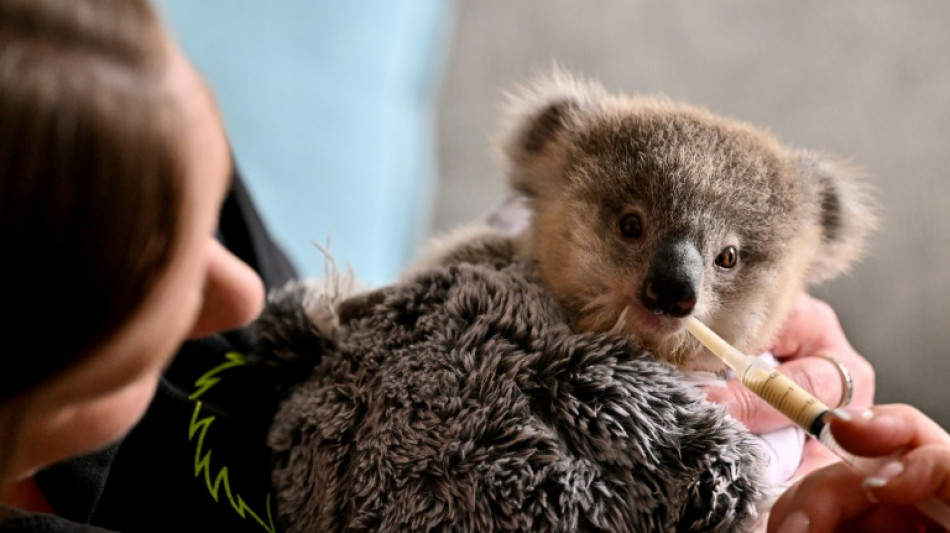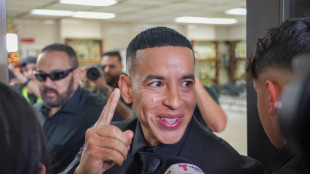
-
 Ski great Vonn finishes 14th on World Cup return
Ski great Vonn finishes 14th on World Cup return
-
Scholz visits site of deadly Christmas market attack

-
 Heavyweight foes Usyk, Fury set for titanic rematch
Heavyweight foes Usyk, Fury set for titanic rematch
-
Drone attack hits Russian city 1,000km from Ukraine frontier

-
 Former England winger Eastham dies aged 88
Former England winger Eastham dies aged 88
-
Pakistan Taliban claim raid killing 16 soldiers

-
 Pakistan military courts convict 25 of pro-Khan unrest
Pakistan military courts convict 25 of pro-Khan unrest
-
US Congress passes bill to avert shutdown

-
 Sierra Leone student tackles toxic air pollution
Sierra Leone student tackles toxic air pollution
-
German leader to visit site of deadly Christmas market attack

-
 16 injured after Israel hit by Yemen-launched 'projectile'
16 injured after Israel hit by Yemen-launched 'projectile'
-
Google counters bid by US to force sale of Chrome

-
 Russia says Kursk strike kills 5 after Moscow claims deadly Kyiv attack
Russia says Kursk strike kills 5 after Moscow claims deadly Kyiv attack
-
Cavaliers cruise past Bucks, Embiid shines in Sixers win

-
 US President Biden authorizes $571 million in military aid to Taiwan
US President Biden authorizes $571 million in military aid to Taiwan
-
Arahmaiani: the Indonesian artist with a thousand lives

-
 Indonesians embrace return of plundered treasure from the Dutch
Indonesians embrace return of plundered treasure from the Dutch
-
Qualcomm scores key win in licensing dispute with Arm

-
 Scientists observe 'negative time' in quantum experiments
Scientists observe 'negative time' in quantum experiments
-
US approves first drug treatment for sleep apnea

-
 US drops bounty for Syria's new leader after Damascus meeting
US drops bounty for Syria's new leader after Damascus meeting
-
Saudi man arrested after deadly car attack on German Christmas market

-
 'Torn from my side': horror of German Christmas market attack
'Torn from my side': horror of German Christmas market attack
-
Bayern Munich rout Leipzig on sombre night in Germany

-
 Tiger in family golf event but has 'long way' before PGA return
Tiger in family golf event but has 'long way' before PGA return
-
Pogba wants to 'turn page' after brother sentenced in extortion case

-
 Court rules against El Salvador in controversial abortion case
Court rules against El Salvador in controversial abortion case
-
French court hands down heavy sentences in teacher beheading trial

-
 Israel army says troops shot Syrian protester in leg
Israel army says troops shot Syrian protester in leg
-
Tien sets-up all-American NextGen semi-final duel

-
 Bulked-up Fury promises 'war' in Usyk rematch
Bulked-up Fury promises 'war' in Usyk rematch
-
Major reshuffle as Trudeau faces party pressure, Trump taunts

-
 Reggaeton star Daddy Yankee in court, says wife embezzled $100 mn
Reggaeton star Daddy Yankee in court, says wife embezzled $100 mn
-
Injured Eze out of Palace's clash with Arsenal

-
 Norway's Deila named coach of MLS Atlanta United
Norway's Deila named coach of MLS Atlanta United
-
Inter-American Court rules Colombia drilling violated native rights

-
 Amazon expects no disruptions as US strike goes into 2nd day
Amazon expects no disruptions as US strike goes into 2nd day
-
Man Utd 'more in control' under Amorim says Iraola

-
 Emery insists Guardiola 'still the best' despite Man City slump
Emery insists Guardiola 'still the best' despite Man City slump
-
US confirms billions in chips funds to Samsung, Texas Instruments

-
 English Rugby Football Union chairman quits amid pay row
English Rugby Football Union chairman quits amid pay row
-
Major reshuffle as Trudeau faces party pressure, Trump attacks

-
 Gatland remains as Wales boss but must 'change fortunes on the pitch'
Gatland remains as Wales boss but must 'change fortunes on the pitch'
-
Argentina's dollar craze cools under greenback-loving Milei

-
 Medici secret passageway in Florence reopens after refit
Medici secret passageway in Florence reopens after refit
-
Anger after Musk backs German far right

-
 Arteta says 'best is yet to come' as he marks five years at Arsenal
Arteta says 'best is yet to come' as he marks five years at Arsenal
-
Pereira happy to achieve Premier League 'target' with Wolves

-
 'Dark lull' in German energy transition sparks political debate
'Dark lull' in German energy transition sparks political debate
-
Russian skaters allowed to compete as neutrals in 2026 Winter Olympics


Cars, chlamydia threaten Australian koalas
Clinging to a fluffy toy twice her size, orphaned koala joey Ajooni made a snuffling noise as she drank milk from a tiny syringe.
Weighing about the same as a mango, she was found by the side of a Sydney road where her mother was hit by a car and died.
It is a familiar tale for wildlife carer Emma Meadows.
Over the past two years, Meadows and other volunteers have recovered 40 koalas hit by cars in their neighbourhood. The number left for dead is likely much higher.
Koalas are shy and notoriously difficult to count.
There are anywhere between 95,000 and 524,000 left in Australia, possibly down from millions before European settlement.
There is little doubt that expanding cities, land clearance and the spread of chlamydia are devastating the populations of one of Australia's most iconic animals.
East Coast koalas were officially listed as "endangered" by the Australian government in 2022.
"I actually, truly, believe we're heading towards extinction," said Meadows, a volunteer with WIRES.
"I don't know if there is any coming back from this. I'm scared it's too late."
Chlamydia was first observed in koalas about 50 years ago. In the decades since, it has wiped out entire local populations.
The bacteria leads to blindness, bladder infections, infertility, and death.
Although some chlamydia-free koala populations exist –- such as the area where Ajooni was found -– scientists fear these pockets may soon disappear.
- World's 'extinction capital' -
Annabelle Olsson, director of the University of Sydney Wildlife Health and Conservation Hospital, has regularly examined rescued koalas -- including seven-month-old Ajooni.
On the day AFP visited the centre, a sedated three-year-old koala lay on an operation table, while Olsson and her team took the marsupial's blood, did X-rays and examined the koala's face.
The koala was chlamydia-free but had a head injury that impacted her reflexes and would require further attention.
Olsson said without better koala protections "our grandchildren, or at least their grandchildren, are going to see maybe koalas in a zoo if they're lucky".
"Australia is an island nation with an incredibly high biodiversity and incredibly unique wildlife species and floral species that need to be preserved," she said.
Scientists believe Australia has the highest rate of mammal extinction in the world, with about 100 of the country's unique flora and fauna species wiped out in the last 123 years.
Environment minister Tanya Plibersek has said Australia is "the mammal extinction capital of the world. "
While there are some rules and guidelines to protect koala habitats, koala bushland continues to be cleared.
- Vaccine hopes -
Some have instead focused their conservation efforts on quelling the spread of koala chlamydia.
University of the Sunshine Coast researcher Samuel Phillips is part of a team working on a potential vaccine.
They have vaccinated and monitored 165 koalas over 10 years and found inoculated marsupials developed chlamydia later in life and their mortality was reduced by 64 percent.
A Queensland trial of the vaccination, used in conjunction with traffic and predator controls, was so successful that a local koala population doomed for extinction within 10 years rebounded.
Some marsupials will even need to be translocated to stop overpopulation, Phillips said.
"It's been a really positive story," he said.
However, Phillips warns that more needs to be done to address the other key drivers of koala decline, particularly the deforestation of their habitats.
"We can keep protecting these small populations, but without increasing the habitat and protecting it, then they won't be living."
- 'Make a difference' -
Ajooni will remain in Meadow's care until she is big enough to be released back into the wild.
It will be a "bittersweet" moment for Meadow, but she says seeing any koala successfully released is the best feeling.
That feeling is what keeps her going through the awful parts of her volunteer role: scraping dead koala bodies off the road in the middle of the night, or finding animals that are so severely injured that they need to be put down.
"I continue to do what I do because somebody needs to make a difference, and I feel that this is one way in the world that I can make a difference," Meadows said.
H.Silva--PC




